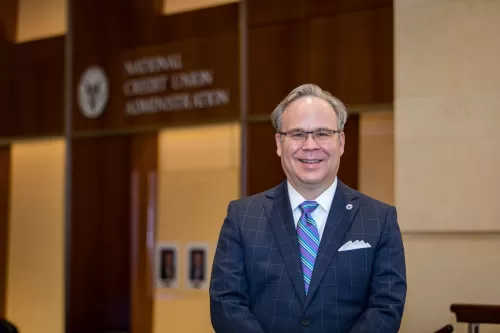NCUA Chairman Todd M. Harper at the agency's Headquarters in Alexandria, Virginia.
As Prepared for Delivery on March 18, 2021
This week, we marked the one-year anniversary of the NCUA team working in a remote posture because of the COVID-19 pandemic. None of us could have anticipated the extraordinary circumstances in which we found ourselves during the last 12 months. Yet, NCUA employees and federally insured credit unions have each exhibited tremendous resilience, under some of the most trying circumstances.
Before we continue, I would like us to engage in a moment of silence in memory of those who we have lost, including those members of the NCUA family to COVID-19 and those Asian Americans targeted in racist violence and harassment since news about a virus began appearing in U.S. media outlets.
To those members of the NCUA team who are listening from their home offices: Thank you for your good work and for supporting your colleagues amidst this crisis. Although I miss working by your side in the central office, I look forward to seeing you in-person again only when it is safe to do so — and not a moment sooner.
And, to those of you working at federally insured credit unions across our country: Thank you for serving as financial first responders. Your work is helping your members handle countless pandemic-induced economic challenges. I have always been incredibly proud of the credit union movement, never more so than now.
Late last week, millions of credit union members began receiving stimulus payments through the American Rescue Plan. Lawmakers intended for consumers to spend these checks on necessities like food, shelter, utilities, and medical care. However, because the new law lacks necessary guardrails, I am very concerned that some financial institutions may soon make shortsighted decisions to use these stimulus funds to instead pay for overdraft fees, outstanding debts, and other liabilities. Financially stressed American consumers deserve better treatment.
As financial first responders who support their members in times of need, many federally insured credit unions have already voluntarily decided to protect their members’ relief payments from collection, garnishment, and the right of offset. By demonstrating the cooperative philosophy at the heart of the credit union movement, these credit unions are doing the right thing. And, as American consumers — many of whom are disproportionately people of color — struggle through the economic shock inflicted by the COVID-19 crisis, all credit unions should strive to live up to this foundational principle.
That concludes my comments, and I know that my fellow Board members would like to make remarks on this anniversary, as well. Vice Chairman Hauptman, you are recognized.




